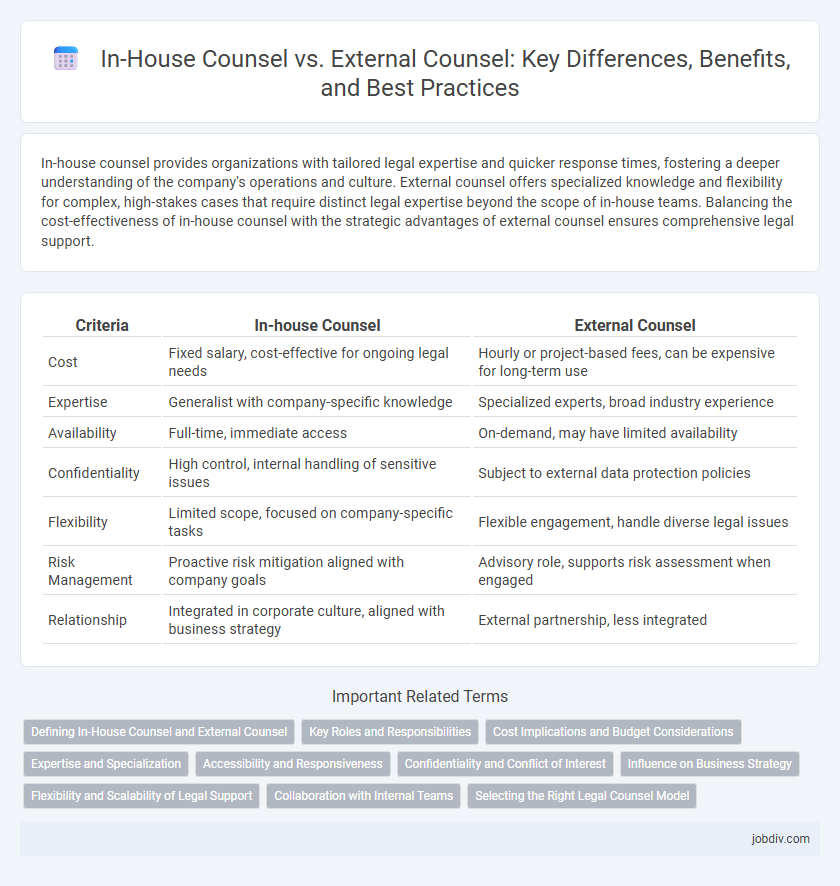In-house counsel provides organizations with tailored legal expertise and quicker response times, fostering a deeper understanding of the company's operations and culture. External counsel offers specialized knowledge and flexibility for complex, high-stakes cases that require distinct legal expertise beyond the scope of in-house teams. Balancing the cost-effectiveness of in-house counsel with the strategic advantages of external counsel ensures comprehensive legal support.
Table of Comparison
| Criteria | In-house Counsel | External Counsel |
|---|---|---|
| Cost | Fixed salary, cost-effective for ongoing legal needs | Hourly or project-based fees, can be expensive for long-term use |
| Expertise | Generalist with company-specific knowledge | Specialized experts, broad industry experience |
| Availability | Full-time, immediate access | On-demand, may have limited availability |
| Confidentiality | High control, internal handling of sensitive issues | Subject to external data protection policies |
| Flexibility | Limited scope, focused on company-specific tasks | Flexible engagement, handle diverse legal issues |
| Risk Management | Proactive risk mitigation aligned with company goals | Advisory role, supports risk assessment when engaged |
| Relationship | Integrated in corporate culture, aligned with business strategy | External partnership, less integrated |
Defining In-House Counsel and External Counsel
In-house counsel are legal professionals employed directly by an organization to provide ongoing legal advice and manage internal legal matters, ensuring alignment with corporate strategy and operational needs. External counsel refers to law firms or independent attorneys contracted on a case-by-case basis for specialized expertise, litigation support, or when additional resources are required beyond the capacity of in-house teams. The strategic choice between in-house and external counsel impacts cost-efficiency, confidentiality, and access to diverse legal skills.
Key Roles and Responsibilities
In-house counsel primarily manages legal risks, advises internal departments on regulatory compliance, and oversees corporate governance within the organization. External counsel provides specialized legal expertise, represents clients in litigation, and handles complex transactions requiring jurisdictional knowledge beyond the company's operations. Both roles collaborate to ensure comprehensive legal strategy, balancing cost efficiency and access to specialized skills.
Cost Implications and Budget Considerations
In-house counsel typically offers lower overall costs through fixed salaries and integrated team collaboration, reducing the need for external billable hours and minimizing unforeseen expenses. External counsel often incurs higher hourly rates and additional fees but provides specialized expertise for complex legal matters that in-house teams may lack. Budget considerations should weigh the predictability of in-house staffing costs against the flexibility and potential high costs of external firms during peak demands or specialized cases.
Expertise and Specialization
In-house counsel offer deep organizational knowledge, enabling tailored legal strategies that align with company goals, while external counsel provide specialized expertise in niche areas like intellectual property or international law. Companies often engage external counsel for complex or highly technical matters requiring specific legal skills and certifications not available internally. Leveraging both in-house and external counsel ensures comprehensive legal coverage, balancing consistent oversight with expert insights.
Accessibility and Responsiveness
In-house counsel offers immediate accessibility and faster response times due to their direct integration within the company, enabling real-time support for urgent legal issues. External counsel may experience delays in communication and availability but provides specialized expertise through scheduled consultations. Prioritizing accessibility and responsiveness depends on a company's need for quick legal intervention versus access to external expert resources.
Confidentiality and Conflict of Interest
In-house counsel maintain strict confidentiality due to their ongoing relationship and direct access to sensitive company information, minimizing risks of information leaks. External counsel faces heightened challenges in managing conflicts of interest, as they may represent multiple clients with competing interests, necessitating rigorous conflict checks and clear ethical boundaries. Both roles require adherence to professional confidentiality standards, but the internal positioning of in-house counsel inherently strengthens protection against conflicts of interest.
Influence on Business Strategy
In-house counsel offers direct alignment with corporate objectives, integrating legal risk management seamlessly into business strategy development. External counsel provides specialized expertise and objective perspectives that enhance strategic decision-making, particularly in complex or niche legal areas. Collaboration between in-house and external counsel ensures robust legal frameworks that support sustainable business growth and regulatory compliance.
Flexibility and Scalability of Legal Support
In-house counsel offers tailored legal support with immediate accessibility, fostering seamless integration within company operations for agile decision-making. External counsel provides scalable expertise across diverse legal domains, enabling businesses to adjust resources quickly based on fluctuating case volumes or specialized needs. Combining both options strategically enhances organizational flexibility and cost efficiency in managing complex legal challenges.
Collaboration with Internal Teams
In-house counsel typically holds a strategic advantage in collaborating with internal teams due to their ongoing presence and deeper understanding of company culture, operations, and risk tolerance. They facilitate seamless communication and quick legal solutions aligned with business objectives, enhancing efficiency in compliance and contract management. External counsel, while providing specialized expertise and objective perspectives, may face challenges in syncing with internal departments, often requiring more structured engagement to integrate legal strategies effectively.
Selecting the Right Legal Counsel Model
Selecting the right legal counsel model depends on factors such as the complexity of legal issues, cost efficiency, and the need for specialized expertise. In-house counsel offers direct control and deeper corporate understanding, ideal for ongoing legal needs and aligned business strategy. External counsel provides flexibility and access to niche specialties, making it suitable for episodic, high-stakes, or widely varied legal challenges.
In-house Counsel vs External Counsel Infographic

 jobdiv.com
jobdiv.com